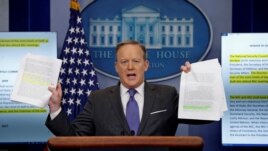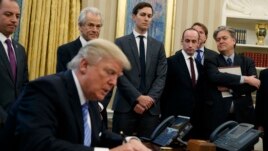02 February, 2017
The Trump administration is being criticized for giving a top political adviser a seat on the president's National Security Council, or NSC.
Trump recently signed an order making changes to the NSC, which advises the president on national security issues and foreign policy. The order gave Trump's top strategist Steve Bannon a seat on the NCS's "principals committee."
The principals committee also includes top cabinet officials including the secretary of state and secretary of defense.
The order also changed a requirement for other members of the principals committee – the Chairman of the Joint Chiefs of Staff and the Director of National Intelligence. These individuals will no longer be required to attend all meetings of the committee. They will only have to attend when "issues pertaining to their responsibilities and expertise are to be discussed."

White House spokesman Sean Spicer holds up documents comparing the makeup of the National Security Council (NSC) in the Trump and Obama administrations during his press briefing at the White House in Washington, D.C., Jan. 30, 2017.
White House Press Secretary Sean Spicer was asked whether the changes amounted to a demotion for the two officials. He called that idea "nonsense." He said the order did not change the fact that those positions are still part of the NSC. Spicer added that the change will allow the officials to avoid some meetings that don't directly relate to their departments.
Some are critical of Bannon's seat in the NSC
Most of the criticism of Trump's NSC reorganization has focused on Bannon. He was a close political adviser to Trump throughout his campaign and was appointed as his top strategist in the White House.
Leon Panetta served in past administrations as secretary of defense and director of the Central Intelligence Agency. He told CNN he was concerned about Trump giving a seat on the NSC to a political adviser.
The purpose of the NSC is to provide the president with the best advice from the top national security experts, Panetta said. "It isn't to have a political adviser who is going to make recommendations based on what polls well. That's the worst thing you could do."
Republican Senator Susan Collins of Maine serves on the Select Committee on Intelligence. She told Maine Public Radio,
"(Bannon) does not have the expertise that the director of National Intelligence or the chairman of the Joint Chiefs of Staff have, and this is entirely inappropriate."
Senator John McCain, a Republican from Arizona, praised Trump's national security team overall. But he criticized the choice of Bannon. He called the appointment "a radical departure from any National Security Council in history."

White House chief strategist Steve Bannon (far right) is among the top policy advisers present as President Donald Trump signs an executive order in the Oval Office, Monday, Jan. 23, 2017.
Spicer responded to the criticisms by pointing out Bannon's experience in the Navy and with international affairs. "He is a former naval officer. He's got a tremendous understanding of the world and the geopolitical landscape that we have now," Spicer told ABC's This Week.
He added that "having the chief strategist for the president in those meetings, who has a significant military background, to help make and guide what the president's final analysis is going to be, is "crucial."
Is it legal?
Some critics have cited a part of US law that outlines the legal structure of the NSC. The law mentions a requirement for NSC members to be appointed by the president, as well as "by and with the advice and consent of the Senate."
However, some legal experts who studied Trump's order have concluded that Bannon likely does not require approval from the U.S. Senate to sit on the NSC committee.
One expert noted that Trump's order designates Bannon as an "invitee" to attend all meetings of the NSC, but not as a full member of the committee.
Legal scholar Laurence Tribe from America's Harvard University Law School tweeted his opinion on the issue. He said he does not believe Bannon needs Senate confirmation to serve on the principals committee, which in his words "isn't part of the NSC as such."
Tribe added that "the role Bannon has been given is crazy and dangerous, but it doesn't seem to violate any law, though it probably should."
Democratic Senator Mark Warner of Virginia announced he will introduce legislation to clarify who can legally serve on the NSC. He called Trump's choice of Bannon "misguided" and "deeply troubling."
Warner's bill would require Congressional approval for a non-Senate confirmed political choice such as Bannon to the NSC. However, the legislation has little chance of passing in the Republican-controlled Congress.
I'm Bryan Lynn.
Bryan Lynn wrote this story for VOA Learning English, based on reporting by VOA's Jeff Seldin and the Associated Press. Hai Do was the editor.
We want to hear from you. Write to us in the Comments section, and visit 51VOA.COM.
_______________________________________________________________
Words in This Story
strategist – n. person good at making plans for achieving successful goals
pertain – v. relate to something
demotion – n. change in rank to a lower position
inappropriate – adj. not suitable
clarify – v. make something clear or easier to understand
landscape – n. particular area of activity
crucial – adj. extremely important or necessary
consent – n. permission for something to happen
designate – v. choose someone for a purpose or position